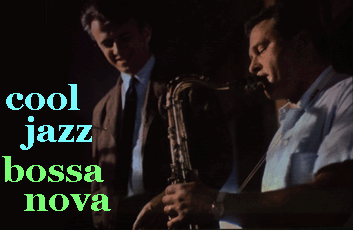 Throughout the 20th Century, Brazilian music and jazz were intimately entwined, particularly during the bossa nova boom of the late 1950s and early 1960s. Here's an overview of Brazilian and Brazilian-flavored jazz, with artists new and old...
Throughout the 20th Century, Brazilian music and jazz were intimately entwined, particularly during the bossa nova boom of the late 1950s and early 1960s. Here's an overview of Brazilian and Brazilian-flavored jazz, with artists new and old...

 Throughout the 20th Century, Brazilian music and jazz were intimately entwined, particularly during the bossa nova boom of the late 1950s and early 1960s. Here's an overview of Brazilian and Brazilian-flavored jazz, with artists new and old...
Throughout the 20th Century, Brazilian music and jazz were intimately entwined, particularly during the bossa nova boom of the late 1950s and early 1960s. Here's an overview of Brazilian and Brazilian-flavored jazz, with artists new and old...
This page covers the Letter "M"
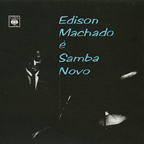 Edison Machado "...E Samba Novo" (CBS, 1963)
Edison Machado "...E Samba Novo" (CBS, 1963)

As if often the case with these Brazilian jazz albums, there's not really much of a homegrown samba influence to be heard... Even though the songs covered are include bossa standards and several originals by saxophonist J.T. Mierelles, the feel is straight-up, swinging jazz. Still, as a jazz album, this is pretty creditable... Since bandleader Machado plays drums, there is an Art Blakey-like emphasis on the snares (though less of a "pure" hard jazz style). With him is an all-star cast: Mierelles and Paulo Maura on sax, Tenorio, Jr. on piano, and Moacir Santos writing and arranging the bulk of the album. If you're looking for noteworthy Brazilian jazz albums, this is one of the best.
![]() Edison Machado "Obras" (Vivid Sound, 2002)
Edison Machado "Obras" (Vivid Sound, 2002)

![]() Edison Machado "Obras 2: O Pulo Do Gato" (Vivid Sound, 2004)
Edison Machado "Obras 2: O Pulo Do Gato" (Vivid Sound, 2004)

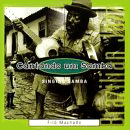 Filo Machado "Cantando Um Samba" (Malandro, 1999)
Filo Machado "Cantando Um Samba" (Malandro, 1999)

Slick, busy, somewhat manic modern jazz fusion, Brazilian style. Guitarist Filo Machado is a veteran player who has worked with Alaide Costa, Flora Purim, Joyce, Djavan and others... Nonetheless, I really don't like this style of music, so I may be the wrong person to ask about this album... I suppose some fans of modern jazz might like it; I just found it cluttered and kind of annoying.
Rogerio Botter Maio "Crescendo" (Gero Music, 1996)


The first solo album by bassist Rogerio Botter Maio, a fixture on the modern Brazilian jazz scene. Features guest performances by vocalist Jane Duboc, Romero Lubambo, Hendrik Meurkens, Dom Salvador, Claudio Roditi and others.
Rogerio Botter Maio "Aprendiz" (Eldorado, 2000)


Rogerio Botter Maio "Conto Da Superficie" (Tratore, 2004)

Rogerio Botter Maio "Prazer Da Espera " (Gero Music, 2006)


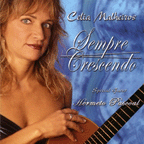 Celia Malheiros "Sempre Crescendo" (Sempre Crescendo, 2001)
Celia Malheiros "Sempre Crescendo" (Sempre Crescendo, 2001)

A Brazilian expatriate living in California, Malheiros recorded this album in Rio, with a slew of top Brazilian jazz talent to back her up. Hermeto Pascoal, Wilson Das Neves and others contribute to this lush set of soft jazz tunes that recall the heyday of '70s MPB-era fusion by the likes of Flora Purim and Tania Maria; although Malheiros doesn't get as swoopy or wild as those foremothers, preferring to stay on the mellow side, she's still in the same ballpark. (Artist website: www.celiamalheiros.com)
Celia Malheiros "Cenario Brasileiro" (2006)

With guest appearance by Joao Bosco...
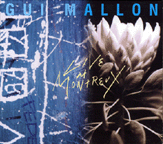 Gui Mallon "Live At Montreux" (Adventure Music, 2004)
Gui Mallon "Live At Montreux" (Adventure Music, 2004)

Brazilian-born guitarist Gui Mallon is an expatriate living in Switzerland; here, he's assembled a top-flight European band for a smooth-jazz set glides nimbly over a solid foundation of Brazilian melody. Rhythmically, this is a very strong set, surprisingly so for a band that seems mostly made up of northern Europeans... It's more "Brazilian" at it's core than you'd imagine, although when the jazz elements kick in, you definitely know it. There's one thing that sinks it for me, though, and that's the prominence placed on the soprano saxophone, an instrument that I generally regard with pure loathing. Still, I was able to listen to this entire album without skipping tracks, etc., so these guys must have been doing something right! If you like smooth jazz that has a little bite to it, then this set is well worth checking out!
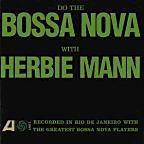 Herbie Mann "Do The Bossa Nova" (Atlantic, 1962)
Herbie Mann "Do The Bossa Nova" (Atlantic, 1962)


Recorded in Brazil, with Baden Powell, Antonio Carlos Jobim, Dom Um Romao, and Paulo Moura on various tracks. The back-up is solid, as is the repertoire (Jobim, Vinicius, Carlos Lyra, etc) but you really have to be into the flute as a lead instrument to appreciate this one. A bit on the breezy side.
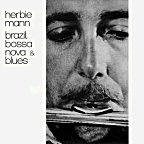 Herbie Mann "Brazil, Bossa Nova & Blues" (United Artists, 1962)
Herbie Mann "Brazil, Bossa Nova & Blues" (United Artists, 1962)
This was a real surprise, since I disliked the more famous Do The Bossa Nova album so much... Perhaps part of the problem was the mismatch of Mann with the bossa biggies in that earlier session. Here he's working instead with a bunch of hip jazzcats who were perhaps more closely attuned to his musical ideas... and it's a pretty nice cast of characters, including Latin jazz percussionists Willie Bobo and Patato Valdez, along with Dave Pike and Hapgood Hardy on marimba and vibes, respectively... It's still a bit breezy, but the sessions do swing. Worth checking out.
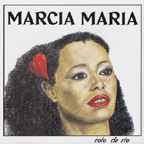 Marcia Maria "Colo Do Rio" (Caravage/L'Arome, 1985)
Marcia Maria "Colo Do Rio" (Caravage/L'Arome, 1985)

Clattersome, overly energetic samba-jazz vocals from a Brazilian expatriate living in Paris, backed by an enthusiastic European trio. This is the sort of music that, when I play it at home, my wife is likely to hurl heavy objects at me across the room in order to make it stop. Maria's aggressive approach derives from the Tania Maria-Elis Regina school of shouted vocal power... I found this to be really irritating, though jazz fans might be more forgiving. Apparently, Maria recorded one album earlier in Brazil, not long before she headed for France.
Marcia Maria "Brasil Nativo" (Fremeaux & Asocies, 2008)

Tania Maria - see artist discography
Cesar Camargo Mariano - see artist discography
![]() Torcuato Mariano "Diary" (215 Records, 2004)
Torcuato Mariano "Diary" (215 Records, 2004)

A very, very soft jazz fusion set. Not my cup of tea, but for the smooth jazz set, I imagine this'd be kinda nice.
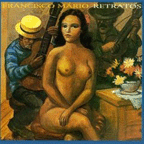 Francisco Mario "Retratos" (Fantasy/Caju, 1994)
Francisco Mario "Retratos" (Fantasy/Caju, 1994)

This reissue pairs up two albums by Minas Gerais guitarist Francisco Mario, Conversas De Cordas, Courous, Palhetas E Metais, from 1984, and 1986's Retrato, which found him working with many of Brazil's best modern jazz/choro performers, such as Zeca Assumpcao, Paulinho Baga and Raphael Rabello (who played on the Conversas album...) Nice stuff, with a wide variety of regional influences; his use of amplification makes him sound a bit like a Brazilian Chet Atkins... Apparently Mario died in 1988, from HIV disease... Alas! Another voice sadly silenced.
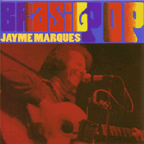 Jayme Marques "Brasil Pop" (RCA-Spain, 1975)
Jayme Marques "Brasil Pop" (RCA-Spain, 1975)

A Brazilian guitarist who initially took his cues from the Baden Powell/Luiz Bonfa school, Marques was a Mato Grosso native who toured Europe in the early '60s, and is credited with introducing bossa-jazz to European audiences. He later recorded several albums in Spain during the 1970s, becoming a significant exponent of bossa-soul fusion. This early album starts off with fairly standard material -- a jazzed-up version of "Berimbau," followed by several guitar-centered tunes. Breezy keyboards come in midway, and his jazz-fusion tendedncies become even clearer with the inclusion of a couple of Marcos Valle tunes. This is pretty lightweight, muzak-y stuff, a little stiff sounding, but not unpleasant (other than his atrocious soul vocals!) This will probably float your boat if you're into the whole lounge/acid jazz sound.
Jayme Marques "Jayme Marques" (RCA-Spain, 1976)

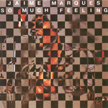 Jayme Marques "So Much Feeling" (RCA-Spain, 1977)
Jayme Marques "So Much Feeling" (RCA-Spain, 1977)

This has a more deliberate (and more accomplished) jazz-fusion feel... Sleek LA Transfer-style keyboards, flute and bossa rhythms predominate, and while this is decidedly cheesy, easy listening, it's also nice in parts. There are a couple of original tunes on here, along with several well-chosen covers, including a Caetano Veloso's "Irene", and a meandering twelve-minute long(!) version of Milton Nascimento's "Vera Cruz." I'd be a little embarrassed playing this on the radio or listening to it casually at home, but I suppose it's worth checking out.
Jayme Marques "En Directo" (RCA-Spain, 1979)

Jayme Marques "The London Connection"

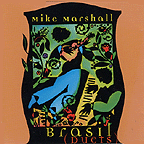 Mike Marshall "Brasil (Duets)" (Earthbeat, 1996)
Mike Marshall "Brasil (Duets)" (Earthbeat, 1996)

Following a trip to Brazil in 1995, newgrass mandolin whiz Mike Marshall decided to tackle an entire album of Brazilian choro music, the zippy, propulsive instrumental style pioneered in the late 1800s, alongside it's better-known musical cousin, the samba. On this album Marshall performs some of the best known songs in the genre, as well as several that are further off the beaten track, playing in tandem with the likes of jazzgrass picker Bela Fleck and Edgar Mayer, West Coast jazz maven Andy Narell, and expatriate Brazilian pianist Jovino Santos Neto. Marshall has a real feel for this material: it enlivens his own playing, while he brings a lightness and playful air to this sometimes-rigid genre. This is a disc definitely worth looking for, particularly if you are already a choro fan, or a newgrasser interested in hearing someone stretching into new, dynamic territory.
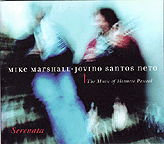 Mike Marshall & Jovino Santos Neto "Serenata: The Music Of Hermeto Pascoal" (Adventure Music, 2003)
Mike Marshall & Jovino Santos Neto "Serenata: The Music Of Hermeto Pascoal" (Adventure Music, 2003)


Delving deeper into his love of choro, and of Brazilian jazz, Marshall explores the work of avantnik multi-instrumentalist Hermeto Pascoal, one of the most original and more challenging modern Brazilian jazz players. On the whole, I would say this set is far less "out there" than most of Pascoal's own albums, but the interplay between mandolinist Marshall and pianist Jovino Santos Neto reveals a strong intuitive link, both between the performers and the music they're tackling. Interesting album with some remarkable moments. Pascoal himself adds a flute solo to one track, giving the album that extra bit of authenticity...
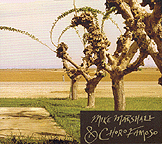 Mike Marshall "Mike Marshall And Choro Famoso" (Adventure Music, 2004)
Mike Marshall "Mike Marshall And Choro Famoso" (Adventure Music, 2004)

This is the latest in a series of choro albums by Marshall, and is perhaps the mellowest set to date... Nice, relaxing stuff, but still with a little kick and enough virtuoso picking to keep even the grumpiest of us from thinking it's just another EZ listening set... Nice stuff, very true to the style with warm versions of classic choro themes by Paulinho Da Viola, Jacob Do Bandolim, and others. Recommended.
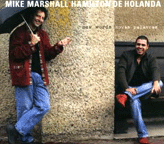 Mike Marshall & Hamilton De Holanda "New Words/Novas Palabras" (Adventure Music, 2006)
Mike Marshall & Hamilton De Holanda "New Words/Novas Palabras" (Adventure Music, 2006)

A strong, playful collaboration between Brazilian mandolinist Hamiltom De Holanda and American bluegrass mandolinist Mike Marshall, who has become a convert to the jazzy Brazilian choro style, which also features dynamic virtuoso flights of instrumental prowess. The repertoire on this delightful set mixes some bluegrass and newgrass tunes into the choro standards; classics by Jacob Do Bandolim and Pixinguinha are lined up alongside by newgrass-jazz tunes by Marshall and Bela Fleck, as well as that oldie-but goodie, "Blackberry Blossom," which is a fine showcase for both picker's zipping along full-throttle. The introduction of Appalachian music into the choro scene should raise a few eyebrows, although I have to confess I was expecting more of a crosscultural mash-up, once Marshall and De Holanda really got going. Nonetheless, there's plenty of dazzling and lyrical playing here, and Marshall's interest in Brazilian acoustic music shows no sign of abating... Thank goodness, 'cuz he's making some really fine music! This set includes a bonus disc of video material which gives some sense of the giddy, competitive showmanship that is the underpinning of traditional choro. Recommended!
Helio Matheus "Helio Matheus" (RCA-Victor, 1975)
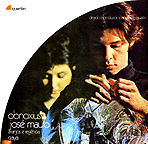 Jose Mauro "Obnoxius" (Quartin, 1970)
Jose Mauro "Obnoxius" (Quartin, 1970)

One of the rare records championed by the European acid-jazz scene which actually lives up to the hype. This lovely album ranges from lovely acoustic balladry to lush (but subtle) orchestral pop. A couple of tracks are mildly irritating, but overall this is a winner. The spacey, melodic numbers prefigure some of Gilberto Gil's calmer moments. Musicians include Paulo Moura and Wilson Das Neves, with arrangements by Maestro Gaya. Recommended!
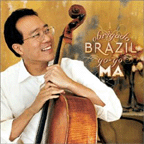 Yo-Yo Ma "Obrigado Brazil" (Sony Classics, 2003)
Yo-Yo Ma "Obrigado Brazil" (Sony Classics, 2003)


Cellist Yo-Yo Ma, possibly the most celebrated classical musician alive, has understandably fallen for the allure of Brazilian bossa nova, having previously explored Appalachian mountain music and the Argentine tango. Yet, like the countless American and European jazz players that precede him, it's difficult to tell in Ma's luso-classical crossover where the subtlety of samba ends and the glass-clinking simplicity of dinner jazz begins. In the baroque world, emotionally resonant, romantic passages are Ma's forte, but the precision and exactitude of Ma's classical background work against him when approaching the odd, interstitial nuances of Brazilian popular music. Backed by Brazilian virtuosi such as percussionists Paulo Braga and Cyro Baptista, Ma excels when playing the fast-paced, Dixieland-ish instrumentals written by choro pioneer Pixinguinha, though on slower, harmonically indefinite material such as the Antonio Carlos Jobim songbook, Ma sounds stiff and stilted, perhaps a little too perfect. Classical fans will doubtless find this album to be an enriching musical journey, while Brazilians may raise a wary eyebrow of amusement. Lovely performances, but they don't completely hit the mark.
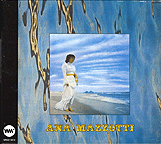 Ana Mazzotti "Ana Mazzotti" (Top Tape/Whatmusic, 1974/2002)
Ana Mazzotti "Ana Mazzotti" (Top Tape/Whatmusic, 1974/2002)

A mellow MPB pop/jazz fusion album from the mid-1970s that features pleasant, if underwhelming, vocals by Ana Mazzotti and musical backing from members of the well-known Brazilian jazz band, Azymuth. This has been hailed by devotees as a lost classic of Brazilian fusion, and I suppose it is, although I wouldn't get too worked up about it. Mazzotti has a refreshingly cool approach to the music, much like Tania Maria but far less frantic, and the arrangements are similarly cool and relaxed. This features "Roda Mundo," a Mazzotti original that has been covered several times since, notably by the singer Salome De Bahia. This is a nice record, worth checking out, but not earth-shattering by any means.
Ana Mazzotti "Ao Vivo -- Festival Do Verao Do Guaruja: 1982" (FIF, 1982)
Gary McFarland "Soft Samba" (Verve, 1964)

Gary McFarland "Soft Samba Strings" (Verve, 1966)

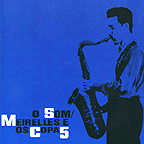 Meirelles & Os Copa 5 "O Som" (Phillips, 1964/Dubas, 2001)
Meirelles & Os Copa 5 "O Som" (Phillips, 1964/Dubas, 2001)

Saxophonist J.T. Meirelles leads a powerhouse band in one of the best Brazilian jazz albums of the early 1960s... Luiz Carlos Vinhas and Eumir Deodato sit in on piano; Edison Machado and Dom Um Romao split the drumming; Roberto Menescal plays acoustic guitar, and Waltel Branco plugs in on electric. Add bassist Manoel Gusmao and trumpeter Pedro Paulo, and you've got one heckuva an all-star band. There's a strong musical debt to Miles Davis and Bill Evans, particularly their work on Kind Of Blue, with some lighter, melodic influences as well. Personally, I'm not enough of a straight jazz fan to really get into it (I wouldn't listen to this recreationally) but I can certainly recognize that these guys were playing with more passion and earnest musicianship than the vast majority of their contemporaries. At a time when the overly-perky, clattersome "bossa trios" dominated the Brazilian jazz scene, this ensemble played with a lot more depth and tonal texture than was the norm. Certainly worth checking out if you're delving into the classic Braz-jazz scene. (Note: the 2001 reissue includes three bonus tracks taken from Meirelles' next album, O Novo Som.)
![]() Meirelles & Os Copa 5 "O Novo Som" (1965/Dubas, 2003)
Meirelles & Os Copa 5 "O Novo Som" (1965/Dubas, 2003)

![]() Meirelles & Os Copa 5 "Samba Jazz!" (Dubas, 2004)
Meirelles & Os Copa 5 "Samba Jazz!" (Dubas, 2004)


![]() Meirelles & Os Copa 5 "Esquema Novo" (Dubas, 2005)
Meirelles & Os Copa 5 "Esquema Novo" (Dubas, 2005)


![]() Meirelles & Os Copa 7 "Tropical" (1967/Whatmusic, 2005)
Meirelles & Os Copa 7 "Tropical" (1967/Whatmusic, 2005)

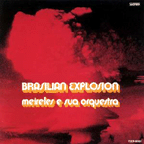 Meirelles "Brasilian Explosion" (London-EMI, 1973)
Meirelles "Brasilian Explosion" (London-EMI, 1973)
I don't get it. Why anyone would want to reissue this tepid easy listening fusionfest is beyond me... Sure, there are goofy, outlandish reinterpretations of classics by Ary Barroso, Pixinguinha and Jorge Ben... but they're *sucky* reinterpretations... At its best, this has a "Thus Spoke Zarathusa"-meets-"Who's That Lady" sound, but it's rarely that creative. Mostly, it's just muzaky moosh.
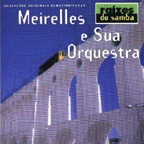 Meirelles "Serie Raizes Do Samba" (EMI, 2000)
Meirelles "Serie Raizes Do Samba" (EMI, 2000)

This collection covers Meirelles' career from a hyperactive, Vegas-y samba bandleader (1967) to a purveyor of proto-disco orchestral pop in the early '70s. A bit scary, but those of a more ironic pop-culture bent may get into the cheesieness of his later stuff. The earlier stuff has some great percussion, but is somewhat undone by the blaring, casino floor-show horn arrangements.
Sergio Mendes - see artist discography
Roberto Menescal - see artist discography
Ronald Mesquita "Bresil '72" (Barclay, 1972)

The drummer for the bossa-jazz band Rio 3, Ronald Mesquita briefly led this Sergio Mendes-ish bossa-pop outfit... The record came out in France; I'm not sure if that's where the group was based as well.
Hendrik Meurkens "Samba Importado" (L & R, 1989)


Hendrik Meurkens "Poema Brasileiro" (Concord, 1996)

With MPB star Ivan Lins...
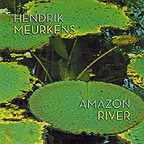 Hendrik Meurkens "Amazon River" (Blue Toucan, 2005)
Hendrik Meurkens "Amazon River" (Blue Toucan, 2005)

A slew of heavyweight Brazilian jazz players -- including guitarist Dori Caymmi, percussionist Duduka Fonseca and album co-producer Oscar Castro-Neves -- back German-born harmonicat Hendrik Meurkens on this sometimes-lively exploration of Brazilian themes... Naturally, comparisons to two other Braz-oriented harmonica virtuosi come to the fore: like Toots Thielemans and Rildo Hora, Meurkens gets pretty mellow, but he also plays it fast, and in both cases comes up against the limitations of his instrument... (Slow sounds gooey, fast a bit goofy...) Nonetheless there are some elegant numbers, generally the vocal tracks, where the harp fades from the lead and becomes more of an accent, and these are pretty nice. Overall, this style of jazz is way too soft for me, but Meurkens does a fine job exploring various aspects of the Brazilian sound, and works in a wide range of styles... Smooth jazz fans will find this album quite lovely.
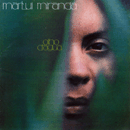 Marlui Miranda "Olho D'Agua" (Warner/Continental, 1979)
Marlui Miranda "Olho D'Agua" (Warner/Continental, 1979)

Marlui Miranda is certainly one of the most challenging Brazilian artists of the post-tropicalia era... Here is where her devotion to indigenous, Amazonian music is first made manifest, on a perplexingly dense, wildly creative, and sometimes quite irritating album. Bassist Zeca Assumpcao joins Miranda and album producer/multi-instrumentalist Egberto Gismonti for a bewildering mix of native Brazilian styles and slick jazz fusion. You can definitely hear a lot of Gismonti's influence in this album, although these performances are a lot livelier than many of his own albums. To be sure, this may not be for everyone, but it's certainly an innovative tour-de-force, worth checking out if you're looking for something completely different. Folks familiar with her later albums, Ihu and Ihu II, (reviewed below) will find this disc of a piece with those albums.
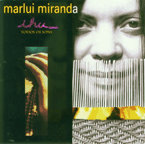 Marlui Miranda "Ihu: Todos Os Sons" (Blue Jackel/Pau Brasil, 1995)
Marlui Miranda "Ihu: Todos Os Sons" (Blue Jackel/Pau Brasil, 1995)

Marlui Miranda "Ihu II" (Blue Jackel/Pau Brasil, 1997)

A challenging figure on the world music landscape, Miranda's Ihu albums draw on the musical and oral traditions of Brazil's 200-plus native tribes. As she herself puts it, the project is "artistic, not ethnographic" -- she's sort of like a Brazilian Meredith Monk, crafting highly unusual vocal landscapes, presenting music from an astonishingly broad range of cultures, but all within a modern artistic framework. Gilberto Gil and Rodolfo Stroeter pitch in, and Miranda's vocal chorus hits harmonies which would make both Le Voix Mysterie Bulgares and the Monks of Santo Domingo stand around a while, just scratching their heads in wonder. The first album is the more sonorous; many listeners may find Ihu II much starker and less accessible.
Miucha - see artist discography
Doris Monteiro - see artist discography
Katia Moraes "Ten Feet And The Sun" (1997)

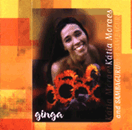 Katia Moraes & Sambaguru "Ginga" (Sugarcane, 1999)
Katia Moraes & Sambaguru "Ginga" (Sugarcane, 1999)

First-rate jazz-MPB vocals in the style of Elis Regina and Gal Costa. Moraes has a sweet, clear voice and sharp phrasing, and is obviously well-versed in Brazilian musical history (the album opens with an homage to various musicians). Likewise, her band, Sambaguru, play tightly and with feeling, covering a wide variety of styles including jazz, samba, axe, and even a bit of Indian classical. It has a few predictable pop foibles, but compared to much of the '70s MPB this is modeled on, this album is a paragon of restraint. Hopefully being based in LA, rather than Rio, won't count against these folks -- they sound great, and deserve a wide
audience. For more info, visit their website at: http://www.katiamoraes.com.
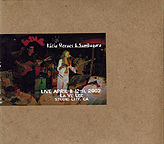 Katia Moraes & Sambaguru "Live: April 11-12th, 2003" (Kufala, 2003)
Katia Moraes & Sambaguru "Live: April 11-12th, 2003" (Kufala, 2003)


A fine live set, recorded in a Studio City, CA nightclub, under what must have been ideal conditions. The sound quality of these recordings is remarkably good, and is matched by the enthusiasm of Moraes and her band. Her similarity to Clara Nunes becomes even more apparent, although there's also a strong jazz element at play here. Most of the songs here are originals, co-written with pianist Bill Brendle, and are of a par with the cover tunes they choose, material by the likes of Joao Bosco, Djavan, Sivuca and Hermeto Pascoal... there's even a tune here by modern rocker Lenine! Two CDs worth of fine material, released on CDR, but still well worth checking out.
Katia Moraes & Sambaguru "Navegar Ao Sol" (Moondo, 2005)


Airto Moreira - see artist discography
Jacques Morelenbaum - see artist discography
Paulo Moura - see artist discography
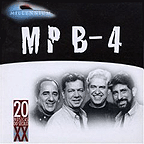 MPB-4 "Millennium" (Polygram, 1998)
MPB-4 "Millennium" (Polygram, 1998)

Incredibly awful pop vocals, loosely modeled on American groups such as The Four Freshmen or Manhattan Transfer. This best-of collection covers the span of the group's career, from 1967 to 1999, with goopy versions of songs written by artists such as Antonio Carlos Jobim and Djavan. MPB-4 are a male version of the Quarteto Em Cy -- a band I detest -- but with glitzier musical backup and less gymnastic vocal arrangements. This stuff is very much not to my taste, but if you're curious, this disc is probably as good an overview of their career as you're likely to find.
MPB-4 "MPB-4" (Elenco, 1966)
The debut album by this Brazilian vocal quartet, the male equivalent of the much-vaunted Quarteto Em Cy. This is the first of several albums self titled "MPB-4" -- this one features several early compositions by Chico Buarque ("Ole Ola," "Juca," "Sonho De Um Carnaval" and "Tereza Tristeza," as well as songs by Vinicius de Moraes, Sergio Ricardo and others. I've never been able to get on the wavelength of these perky vocal groups -- the style seems fairly bland to me -- but if you wanted to check them out, I think these early albums would be the place to start.
MPB-4 "MPB-4" (Elenco, 1968)
MPB-4 "MPB-4" (Elenco, 1968)
![]() MPB-4 "Deixa Estar" (Elenco, 1970)
MPB-4 "Deixa Estar" (Elenco, 1970)


Brazilian Jazz - Letter "N"



Other Brazilian Styles
Main Brazil Index
